
Tom Basden: “There’s something in the imperfection that feels truthful.” Photo: NBCUniversal and Focus Features
How the actor and writer gave voice to a fictional folk duo – and helped ‘The Ballad Of Wallis Island’ sing
On the surface, The Ballad Of Wallis Island tells a strange and tender tale: two folk musicians – once known as McGwyer Mortimer – are lured to a remote island by a lonely superfan, hoping to stage a reunion gig. But what unfolds is something rarer and more affecting. Directed with quiet precision by James Griffiths and written by long-time collaborators Tom Basden and Tim Key, this is a film that sidesteps cliché to become one of the most understatedly beautiful British features in recent years.
Anchored by a pitch-perfect trio – Basden as the brittle, washed-up Herb McGwyer; Carey Mulligan as his estranged musical partner Nell Mortimer; and Key as their painfully eager host Charles – the story moves between comedy and pathos with striking assurance. It’s a small film with a big heart. In short, go and see it.
Alongside the movie itself, a companion soundtrack has been released: a suite of elegantly spare folk songs written by Basden and performed with Mulligan. Wistful and evocative, the music not only enriches the film’s emotional world but stands confidently on its own. That dual achievement made us keen to speak with Basden about how he found the songwriter within…
Read about songwriting for film/tv sync
How many of the songs were written for the original 2007 short film, or was it all new?
“It was a mixture. I think there are only two songs from the 2007 short that made it into the feature, and there are something like 15 in the film in total. I’d say I probably wrote half of them in the lead-up to the shoot. Three or four months before we went to Wales to shoot it, I was writing songs for specific moments in the film. Knowing, by that point, what the story was and what Herb and Nell’s relationship was, it made it a lot easier to think about what the lyrics might have been to their songs back then. Also, talking to the director, thinking about what different parts of the film needed.
“Then, the rest of them… just under half of them are songs that I’d written for myself over the years, between 2007 and 2022, and had in my back pocket. I was briefly in a band with my friend Sophie; there are a few songs from that era, and I sort of retooled them for the film – changed the lyrics but re-used some of those melodies.”
Any examples?
“Give Your Love is a song that I wrote in that period, and then Our Love, the song at the end, was one that I wrote quite a long time before that, probably sometime in about 2010. They’ve been coming on slowly, long gestation periods.”
It sounds like the writing was all in your wheelhouse, rather than you having to embody the character of Herb in order to create the songs?
“It’s a bit of a combination, is the truth. Even though I had written some of these songs over the years, I’d never played them anywhere. I’d never done anything with them, never really recorded them. I was always a bit embarrassed to try and do anything with them. Being able to use them in the film and perform them in character was the ideal way to do it, because it’s sort of at a remove. It’s not quite as mortifying as just a guy with a guitar singing his heart out.”

Tom Basden: “There’s something that’s so fragile about a song where you can fall out of love with it really quickly, or it just feels wrong in a way that you can’t understand why.” Photo: NBCUniversal and Focus Features
So even the new songs were more organic than writing the character and then coming up with song prompts to fit the relevant parts of the film?
“I think it was more organic. The whole film, really, I think Tim and I approached it in such an intuitive way because we knew these characters from the short film we made so long ago. We understood who they were and what they were about, so we never really interrogated the characterisation; we just felt like we could embody that.
“It’s funny, when we first watched the film in front of an audience, some months after we’d shot it, you realise that the characters are quite different, that they’ve changed quite a lot over the years. Not in their fundamentals, but my character had become a bit more hardened and world-weary at the start of the film. Tim’s character had become a bit more tragic; sweeter, but more tragic.
“We never really discussed that. It was never a deliberate thing. The story has that kind of influence on the characters. Then, by extension, the songs you write for those characters, both for Herb and Nell to play, but for Charles to be obsessed with, I feel like…you just feel it. It is unconsciously influenced by the story and what you know about them.”
Did you know which of the songs were going to be the big hitters, that would be featured most prominently?
“Not exactly. There are songs that were in the script, so when we came to actually write the shooting script… in the first draft, it would be, ‘Herb, and Nell play a song.’ Then, after a while, I’d be like, ‘Okay, I think it’s this song.’
“To be fair, both Tim and James Griffiths, the director, really trusted me with that. They were like, ‘If you think that’s the right song, then we’ll do that song.’ So even from fairly early drafts of scripts, as soon as those songs were put in, they were part of the furniture of the film.
“Then the setlist for the gig [in the film], that changed a bit as time went on. As you can imagine, I recorded way more songs than we used for the gig. We just chose the ones that tonally worked the best. You can’t really just suddenly have an entire Glastonbury set at the end of the film. We knew that it had to be a highlights reel of songs that would work well together.”
How did you put the soundtrack together?
“I felt like that first song, Morning Evening, was a good way to open it, and I felt like The Ballad Of Wallis Island, the final song, was a good way to end it. But really, I left that to the director and the editor to figure that out, and then they would drop in a couple of other songs here and there throughout.
“I think the thing that probably changed the most, and the thing that I didn’t necessarily expect, or wasn’t quite prepared for, was the way that we would use score. There was a point where I figured that all of the music and the film would be either McGwyer Mortimer tracks or parts of tracks. To be honest, I was quite resistant to them bringing in score and hiring someone to write and perform score. Now, I’m the first to admit that it’s definitely the right thing to have done.”
Did they take motifs out of the songs and then expand them, or was it all completely different?
“A bit of both. I was very lucky to be working with Adem Ilhan on the score, who’s a brilliant musician and recording artist as well. He’s sort of been in and around the folk scene for 20-odd years, so he was not only a brilliant resource in terms of the characters and the world of it, but he’s also a fantastic musician. He’s so talented and can play all these instruments. He was able to pick out both little motifs from the songs and reuse them in the score, but also bring in new sounds and textures that worked much better as emotional punctuation than I think the songs would have done.
“The other thing is, I think what the director identified is that you need to hold back a lot of the music until the end, until the gig. If we’d saturated the film with these songs, people would have potentially got a bit sick of them, or at least felt like they’d had their fill by the time we got to the gig. There were a lot of decisions that were made later that really helped to elevate the songs and make them feel more special.”

Tom Basden in The Ballad Of Wallis Island: “There was definitely a purple patch leading up to the film where I was writing a lot of songs.” Photo: NBCUniversal and Focus Features
Let’s talk about your songwriting process. Do you have one set way of doing it?
“I don’t know if I’m doing it right, because I’ve not written a huge amount of songs. The way that I was doing it was, I would find a little melody or hook on the guitar and turn it into a bigger melody. Then, it would feel like only certain lyrics would work, tonally, only certain lyrics would work with certain melodies.
“There was something quite organic about the way the songs evolved and the way that they were written. It’s a very weird, elusive thing that you’re doing, where you are trying to… you’re writing something, but you’re discovering it. It’s like you’re finding the thing that it has to be. So, in each case, the lyrics and the melody would emerge together in a weird way. The actual writing of the verses and things, that would come a bit later, and I’d go forwards and backwards with that, but in terms of what the song was about, and what the tone of it was, and where it was rooted, emotionally, it was all so tied up with the melody.”
If you’re someone who can write scripts, dialogues, and plays, is it a given that you can also write lyrics?
“I don’t know. It’s very different. There’s a directness to lyrics. It’s like writing poetry when you’re used to writing prose. When you’re writing in character, when you’re writing a story, you’re aware of everything you’re saying and not saying in a way that the scene needs to start and end. With a song, its purpose is not really clear. Arguably, songs don’t really have a purpose; you’re trying to convey a feeling or an emotional state in a way that is really hard to pin down. A lot of my favourite songs and favourite songwriters, they can just put you in an emotional state and you don’t know how they’ve done it, but it does also mean you don’t really know how to write it.”
Did you find that the more you did it, the easier it became?
“I don’t know, I guess so. There was definitely a purple patch leading up to the film where I was writing a lot of songs. I was in that zone then of writing songs and trying to get them recorded. Then I’d send demos to Tim and James. I really understand why some songwriters can write very, very fast, and then they can spend months not being able to write anything. I do see how that happens. It’s kind of about when you’re in the right headspace to feel creative.
“It’s not like writing a script. In some ways, writing a script is not unlike assembling a jigsaw. Once you know what your story is, you’re just trying things out, and you can make as many mistakes as you like. There’s something that’s so fragile about a song where you can fall out of love with it really quickly, or it just feels wrong in a way that you can’t understand why.”
And were there certain times of day, places, things you were eating, drinking, anything else that aided that purple patch/your songwriting?
“I like the idea of things I was eating and drinking – I wasn’t experimenting with hallucinogens; it wasn’t an LSD binge that went into it. I seem to remember, weirdly, coming up with ideas for songs while my kids were in the bath. I’d be doing voice notes for ideas for little melodies.”
Like lullabies?
“No, I don’t think it was that. It’s just the times when your mind starts to wander. It’s often when I’m trying to sleep as well; when your mind starts to wander, and you’re half-thinking about something and you can discover it a bit. Ideas will come through at quite strange times.
“But also, I feel like just noodling around on the guitar. That’s what I love about the guitar as an instrument. You can literally just try quite unusual chords and shapes and go, ‘Oh, that’s quite an interesting sound,’ and then something will come from that.”

Tom Basden in The Ballad Of Wallis Island: “I don’t know if I have the courage to actually write songs as myself and record them.” Photo: NBCUniversal and Focus Features
Do you like to wear your influences on your sleeves or hide them up your jumper?
“I feel like there’s definitely a couple of influences on the album that I’m very happy to admit to, like Nick Drake. There are a couple of songs where I’m like, ‘Yeah, that’s quite like a Nick Drake song.’
“At times, you wear your influences on your sleeve a bit. At other times…there are songs where I don’t really know who that sounds like, or which artists I’m influenced by. Sometimes in interviews I’ll say, ‘I’m sort of influenced by this artist.’ But then I’m like, ‘I don’t think that’s true.’ I’ll listen to the music, and actually, I don’t think it does sound much like Bonnie Prince Billy, or Ryan Adams, or Gillian Welch, or whoever it is I’m talking about. So, in truth, I don’t really know. Rightly or wrongly, something like Raspberry Fair probably does have a slightly Beatles-y feel to it. It’s weird the way these things come about. I’m still trying to make sense of it.”
Then, when it came to the recording, was there any trepidation that yours and Carey’s voices might not blend well together – that you’ve got this brilliant actor, but it’s not going to work for the songs?
“I think you’ve got to bear in mind, when you’re bringing Carey Mulligan into your very low-budget film that’s written and starring two comedians, there’s trepidation about everything. It’s like, at what point is she going to say, ‘I cannot possibly work with these clowns. This isn’t going to work.’ So, there was enormous, not exactly trepidation, but a sense of, ‘Oh God, I can’t believe we’ve managed to…’ not dupe Carey Mulligan, but certainly, persuade her to be in this. So, in some ways, the voices blending was very low down on the list of things we were worried about.
“We didn’t really have any time to rehearse. We’d play about a bit in the makeup truck. I’d sent her the songs, she’d listened to the songs, and would have questions about the melodies and stuff, but we just had to kind of do it. The thing that’s really lovely about that is, in the film, it really does feel like two people who are both rediscovering how to sing together, while in real life, learning how to sing together. I think that did work really well.
“I couldn’t be happier with the end result. We ended up using all the audio from the day that we shot, rather than recording it again, which we could have done, because it felt really organic and right. There’s something in the imperfection that feels truthful.”
Does the whole thing feel extra special because, alongside this absolute treasure of a film that everyone is embracing, you also have a soundtrack of songs that you’ve written and performed?
“Of course. It’s kind of everything. Tim and I have been really overwhelmed this year, seeing this film getting released and getting really positive feedback from critics and audiences. It really is a culmination of a number of things that we’ve been plugging away doing for a long time that we hadn’t really had the chance to bring to fruition.
“Just the fact we made a film at all, but also the fact that I managed to fold the music up in the writing. We’ve made something that’s really small in its canvas, but on a really big scale, emotionally. It’s been a very meaningful and emotional experience for us all, and we really couldn’t be happier with where we are now.”
Will you continue songwriting?
“I don’t know. I did a gig the other night when launching the album. I really enjoyed that, and I think I would like to do more things like that. I’d like to find a way to perform the songs live – maybe do screenings of the film and then a gig or something like that. That would be really fun. I don’t know if I have the courage to actually write songs as myself and record them, but who knows, watch this space.”


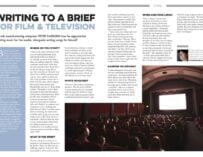
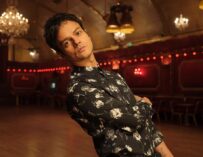
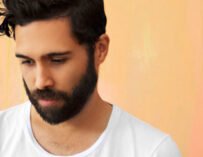

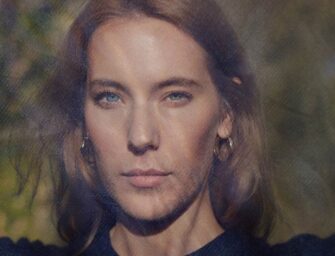
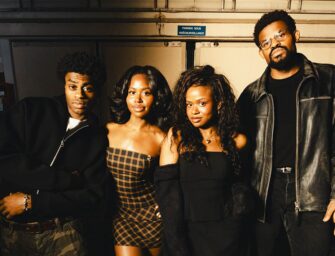


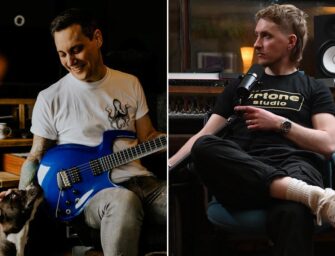





















Related Articles